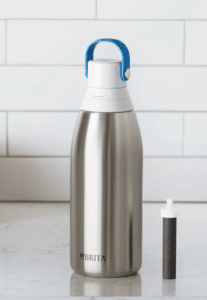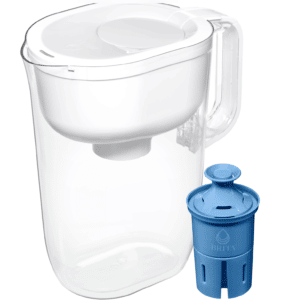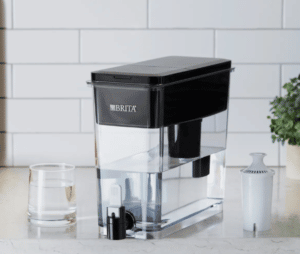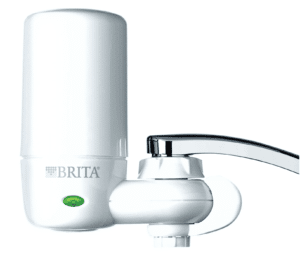Brita is a German brand that excels in water filtration technologies. Its products have seen lots of household use both in the United States of America and all over the world since the conception of the company in 1966. But what do we really know about the filtration capacity and efficiency of these products?
Well, first of all, we should let you know that Brita has many water filter options that work differently. In other words, not all Brita filters remove the same contaminants. So, if you’re in the market for a Brita product, it’s important to know which products remove what contaminants before finalizing a purchase.
What Do Brita Filters Remove?
What does brita filter out? Brita filters remove lead, chlorine, copper, mercury, asbestos, benzene, microplastics and sediments from water.
However, note that brita filters do not remove fluoride from water.
Brita has six different filter types, all of which remove or significantly reduce different kinds of contaminants:
- Bottle filters: Chlorine, taste, odor, and sediments
- Stream filters: Chlorine, taste, odor, and sediments
- Faucet filters: Asbestos, lead, cysts, alachlor, atrazine, benzene, carbofuran, carbon tetrachloride, chlordane, chlorobenzene, endrine, ethylbenzene, lindane, methoxychlor, simazine, styrene, tetrachloroethylene, toluene, toxaphene, trichloroethylene, trihalomethanes, turbidity, volatile organic compounds, chlorine, taste, odor, and sediments
- Standard filters: Copper, mercury, cadmium, chlorine, and zinc
- Elite filters: Lead, mercury, cadmium, asbestos, benzene, atrazine, endrin, ethylbenzene, carbon tetrachloride, simazine, tetrachloroethylene, atenolol, bisphenol A, carbamazepine, estrone, ibuprofen, linuron, meprobamate, metolachlor, microplastics, naproxen, nonyl phenol, trimethoprim, chlorine, and sediments
- Longlast+ filters: Lead, mercury, cadmium, asbestos, benzene, atrazine, endrin, ethylbenzene, carbon tetrachloride, simazine, tetrachloroethylene, atenolol, bisphenol A, carbamazepine, estrone, ibuprofen, linuron, meprobamate, metolachlor, microplastics, naproxen, nonyl phenol, trimethoprim, chlorine, and sediments
Do Brita Filters Work?
Yes, Brita filters are very effective at removing water contaminants like lead, chlorine, benzene, sediments and microplastics. All brita filters come with relevant NSF/ANSI certifications and performance data sheets that list the contaminants they remove, as provided by an independent laboratory.
However, how they perform depends on the particular filter option.
The National Sanitation Foundation (NSF) is a non-profit organization that independently tests and certifies the health claims that manufacturers make about their products. There are three main NSF certifications when it comes to contaminant removal in water filtration technologies:
- NSF/ANSI Standard 42: The NSF 42 certification ensures that the water filter in question is capable of handling aesthetic impurities that the Environmental Protection Agency (EPA) regulates under the National Secondary Drinking Water Regulations. These aesthetic impurities include sediment and chemicals like chlorine and iron that might affect the taste, odor, and color of water.
- NSF/ANSI Standard 53: The NSF 53 certification means that the filtration device can efficiently take care of health hazards that are regulated under the National Primary Drinking Water Regulations by EPA. Such hazards include the presence of dangerous heavy metals like lead, chromium, and mercury in water.
- NSF/ANSI Standard 401: This particular standard tests and certifies removal claims concerning a new breed of contaminants, often referred to as emerging compounds or incidental contaminants. These impurities aren’t exactly aesthetic in essence, but there isn’t comprehensive research about what their possible health effects or safe presence levels in drinking water are. This category includes plastics like Bisphenol A and pharmaceuticals like ibuprofen and estrone.
All Brita water pitchers, dispensers, bottles, faucet mounts, and standard filtration systems have the NSF 42 certification, which confirms their ability to remove sediments, taste, odor, and chlorine from water.
However, not all of them have the NSF 401 or 53. For instance, Brita’s bottle and stream filters only have the NSF 42, and they can only remove aesthetic impurities.
Brita faucet filters and standard Brita filters, on the other hand, have both 42 and 53. These filters can reduce the presence of health hazards like lead and asbestos with an incredible success rate of %99.
Lastly, Brita Elite and the special Longlast+ blue filters have all the relevant NSF certifications. If you’re really concerned about the quality of your household water, opting for products that have these filters can lay your worries to rest.
| Brita Filters | NSF Certifications |
|---|---|
| Bottle Filters | NSF/ANSI Standard 42 |
| Stream Filters | NSF/ANSI Standard 42 |
| Faucet Filters | NSF/ANSI Standards 42 and 53 |
| Standard Filters | NSF/ANSI Standards 42 and 53 |
| Elite Filters | NSF/ANSI Standards 42, 53, and 401 |
| Longlast+ Filters | NSF/ANSI Standards 42, 53, and 401 |
The Technology Behind Brita Filters
As can be derived from the efficiency of different Brita filters in removing different types of contaminants, the technology behind Brita’s filtration options vary from product to product. However, there’s one constant: all the Brita filters use a high-quality activated carbon block to filter aesthetic impurities like chlorine, sediments, taste, odor, and color.
Other than that, the way they filter water and what they can remove in this process is as follows:
- Bottle filter: This particular filter type is present only in Brita’s bottle products, and it filters the water inside the bottle as you drink it. Of course, expecting too much from such a practical filter would be unrealistic as it only features a carbon block that removes aesthetic impurities.
- Stream filter: Stream filter is a specifically designed dual-layer carbon block for Brita’s Stream pitchers. Like the bottle filter, it only removes chlorine, taste, odor, and color. The dual-layer carbon block acts as a sponge that absorbs the said impurities as you pour water into a glass from the pitcher.
- Faucet filter: Found only in Brita Faucet Systems, the faucet filter removes and reduces contaminants as you turn on the tap. In addition to a carbon block, it utilizes a non-woven filter medium with microscopic pore size to stop primary health hazards like asbestos and benzene from ending up in your glass.
- Standard filter: The standard filter of Brita is compatible with Brita dispensers and pitchers. Besides carbon block, it employs built-in mesh filtration media to prevent sediment infiltration. Moreover, it has an ion exchange resin that attracts and traps the ions of some heavy metals, including copper and zinc.
- Elite filter: The elite filter can fit into all Brita dispensers and pitchers, Stream pitchers being the only exception. It provides an upgrade on the standard filter with its ability to remove or reduce emerging compounds and primary hazards like lead and mercury.
- Longlast+ filter: The Longlast+ filter is an even better upgrade on both the standard and elite filters. It features a patented pleated filtration media alongside active carbon agents. As the cherry on top, it can outlast all the filters we mentioned above, so it’s aptly called “Longlast.” It’s compatible with all Brita dispensers and pitchers with the exception of the Stream and Infinity models.
Of course, over time, the efficiency of these filters will deteriorate, and they’ll become redundant unless you replace them in time. Luckily, most Brita products have an automated process that informs you when it’s time to replace your filter.
Which Brita Filter Should You Buy?: The Best Brita Filters
The best brita filters to buy are:
- Water bottle: Brita premium filtering water bottle
- Water pitcher: Brita huron water pitcher
- Water dispenser: Brita Ultramax dispenser
- Faucet filter: Brita complete faucet filter
Best Brita Bottle: Premium Filtering Water Bottle – Stainless Steel, 32oz

- Height: 10.69 inches
- Width: 3.81 inches
- Depth: 3.81 inches
- Weight: 1.15 lbs.
- Contaminants removed: Chlorine, taste, odor, sediment
- NSF certifications: NSF/ANSI 42
The Premium Filtering Brita Water Bottle uses a bottle filter that significantly reduces the chlorine and sediment levels of the water as well as its taste and odor properties. To this end, its straw features an activated carbon block that filters the water as you’re sipping it without causing any hindrance to the water flow, and that’s why we like it.
Another thing we really like about this particular Brita bottle is that, whereas all the other Brita bottles are made of plastic, this is made of stainless steel, which makes it more durable than other options. Additionally, it has double-wall insulation that keeps your water cold for almost the whole duration of the day (24 hours).
And lastly, the 32oz capacity of the Premium Filtering Water Bottle is equal to 6 cups of water, which makes it an excellent carry during long trips, concerts, or similar outdoor activities when you don’t have easy or free access to clean water.
That said, we found cleaning the inside of the bottle difficult since it’s a big one with a small lid. And lastly, its lid is made of plastic, and it doesn’t have a sturdy construction.
Best Brita Water Pitcher: Huron Water Pitcher w/ Elite Filter

- Height: 10.39 inches
- Width: 5.68 inches
- Length: 10.04 inches
- Weight: 1.76 lbs.
- Contaminants removed: Lead, mercury, cadmium, benzene, chlorine, taste, odor, sediment, etc.
- NSF certifications: NSF/ANSI 42, 53, and 401
The Huron Water Pitcher features an Elite filter that can remove a wide variety of contaminants from lead to pharmaceutical byproducts. This filter needs to be replaced only once in every 6 months, which makes it an economical long-term choice.
Considering the contaminant removal efficiency of the filter and the pitcher’s very affordable price tag , you’ll be getting more than you pay for. You can even replace the Elite filter with a Longlast+ to ensure a longer lifespan.
When the time to replace the filter comes, a SmartLight indicator situated on top of the pitcher’s starts giving you a sign, too, which eliminates guesswork about the filter’s effectiveness.
However, the fact that the whole pitcher is made of plastic was a bit disappointing for us. This is not a reason to worry, as it’s completely BPA-free.
Best Brita Water Dispenser: Ultramax Water Dispenser w/ Elite Filter

- Height: 9.67 inches
- Width: 13.94 inches
- Depth: 5.19 inches
- Weight: 3 lbs.
- Contaminants removed: Lead, mercury, cadmium, benzene, chlorine, taste, odor, sediment, etc.
- NSF certifications: NSF/ANSI 42, 53, and 401
Among the three water dispenser options Brita has on offer, the Ultramax Water Dispenser with its Elite filter is the most expensive product with the price of $49.99. However, the fact that the other options entertain only a Standard or Stream filter makes the Ultramax with Elite the most appealing pick.
Similar to the Huron Water Pitcher, the Elite filter of the Ultramax Water Dispenser has a life expectancy of 6 months, but you can also replace it with a Longlast+ filter to have clean water with the same filter for a couple more months. And being a dispenser rather than a pitcher, at 27 cups, its water capacity is an upgrade on the Huron.
It has a slick design that looks well on any counter. Thanks to its compact nature, you can put it into the fridge on hot summer days too.
However, although it’s BPA-free, all of the components of the Ultramax Water Dispenser are plastic, and its plastic spigot is prone to malfunctions and breaks.
Best Brita Faucet-Mount Filter: Complete Water Filter Faucet System w/ Two Filters

- Height: 9.84 inches
- Width: 2.37 inches
- Depth: 6 inches
- Weight: 0.89 lbs.
- Contaminants removed: Lead, mercury, cadmium, benzene, chlorine, taste, odor, sediment, etc.
- NSF certifications: NSF/ANSI 42, 53, and 401
The Brita Complete Water Filter Faucet System might be the most popular Brita filter that you’ll come across. Unlike other faucet filters, the Complete Faucet System has all the relevant NSF certifications that confirm it can remove aesthetic impurities, health hazards, and emerging compounds.
The product package includes two Brita faucet filters that have a combined filtration capacity of 200 gallons of water. Although how long these filters will last depends on the number of people living in your household and their individual water needs, considering that it’s only for drinking water, this is still a good number.
Additionally, the system has a built-in filter indicator that informs you when the filter is no longer efficient. That said, some customers have complained that the indicator isn’t really doing its job.
Conclusion
What a Brita filter can or can’t remove depends on the filter type. While Bottle & Stream filters only remove aesthetic impurities like chlorine, taste, and odor. Standard & Faucet filters can reduce health hazards like lead, mercury, and asbestos. Elite & Longlast+ filters, on the other hand, are certified to remove or reduce emerging compounds like bisphenol A and ibuprofen.